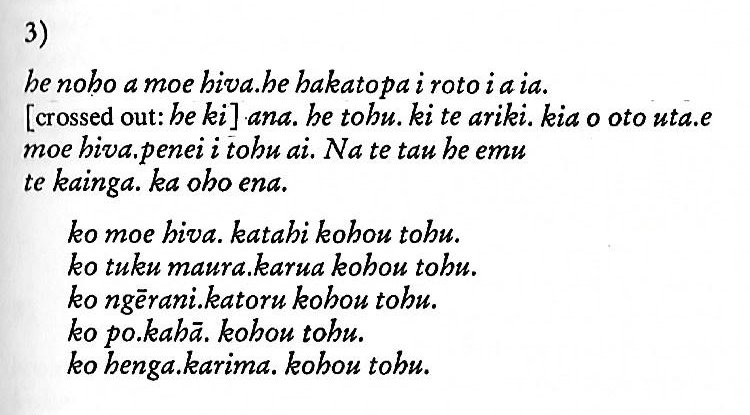
|
E:1 |
| ko oto uta |
ariki motongi |
1 |
Those were the noteworthy rulers (? ariki motongi): Oto Uta, Tangaroa A Oto Uta, Tiki Hati A Tangaroa, Roroi A Tiki Hati, Tuu Kuma A Roroi, Ataranga A Tuu Kuma, Harai A Ataranga, Taana A Harai, Matua A Taana, and Hotu A Matua. |
| ko tangaroa.a oto uta |
ariki motongi |
2 |
| ko tiki hati.a tangaroa |
ariki motongi |
3 |
| ko roroi.a tiki hati |
ariki motongi |
4 |
| ko tuu kumā.a roroi |
ariki motongi |
5 |
| ko ataranga.a tuu kumā |
ariki motongi |
6 |
| ko harai.a ataranga |
ariki motongi |
7 |
| ko taana.a harai |
ariki motongi |
8 |
| ko matua.a taana |
ariki motongi |
9 |
| ko hotu.a matua |
ariki motongi |
10 |
| O maori te ariki nei. etahi te angahuru. |
These ten kings belonged to Maori. |
| ko maori. te ingoa o te kainga. |
Maori was the name of the country. |
| ko marae renga te ingoa. o te maara noho o te ariki.nui. |
Marae Renga was the name of the residence of the great king (ariki nui). |
| ko ma rae tohia te rua maara noho o te ariki. |
Marae Tohia was the second residence of the king. |
|
E:2 |
|
ko moe hiva |
ariki maahu |
1 |
The brothers of the first ruler (? ariki maahu) were Moe Hiva, Tuku Maura, Ngerani, Po, and Henga. |
|
ko tuku maura |
ariki maahu |
2 |
|
ko ngerani |
ariki maahu |
3 |
|
ko po |
ariki maahu |
4 |
|
ko henga |
ariki maahu |
5 |
| Erima maori o te ariki. o oto uta. |
King Oto Uta had five masters (maori): |
|
ko moe hiva.katahi |
the first one was Moe Hiva; |
|
ko tuku maura.karua |
the second one was Tuku Maura; |
|
ko ngerani.katoru |
the third one was Ngerani; |
|
ko po.kahā |
the fourth one was Po; |
|
ko henga.karima |
and the fifth one, Henga. |
| ko moe hiva. te maori i haiteite vai kava te kumi te kumi. o te vai kava. ka peipei rō |
Moe Hiva was the master who taught knowledge of the ocean, who knew about the entire width of the ocean, clear up to where it ends (?). |
| ko tuku maura.katahi. ko ngerani. karua.ko po. |
Of the four masters who instructed in the knowledge of the sun, the moon, the stars, and the sky, Tuku Maura was the first one, Ngerani, the second one; Po, the third one, and Henga, the fourth one. |
| katoru.ko henga.kaha. |
| Ehu maori.i haiteite raa.i te mahina(a).i te |
| hetuu.i te rangi. |
|
E:3 |
| he noho a moe hiva.he hakatopa i roto i a ia. |
Moe Hiva sat down and thought intensely. |
he ki ana. he tohu. ki te ariki. kia o oto uta.e |
Then he made a prediction for the King Oto Uta. This was his prediction: 'There will come a time when the land will sink into the sea.' |
| moe hiva.penei i tohu ai. Na te tau he emu |
| te kainga. ka oho ena. |
|
ko moe hiva.katahi kohou tohu. |
Moe Hiva was the first prophet (kohou tohu, literally, 'staff of prophecy'); Tuku Maura was the second one; Ngerani, the third one; Po, the fourth one; and Henga, the fifth one. |
|
ko tuku maura.karua kohou tohu. |
|
ko ngerani.katoru kohou tohu. |
|
ko po.kahā. kohou tohu. |
|
ko henga.karima. kohou tohu. |
Counting full stop signs: (9 + 4
+ 3) + (2 + 5 + 3 + 13) + (2 + 8
+ 12) = 16 + 23 + 22 = 61
(= 366 / 6).
There would come a time when Land would sink down into the
Sea (te tau emu te kainga).
I cannot avoid thinking of the
Emu constellation of the
Australian aborigines, stretching
all the way down to the bottom of the
sky:
... A depiction of the 'Emu in
the sky', which is an Australian
Aboriginal constellation
consisting of dark clouds rather
than of stars. The European
constellation on the right is
Crux or the Southern Cross, and
on the left is Scorpius. The
head of the emu is the Coalsack
...

|

